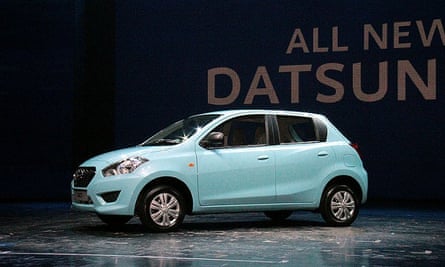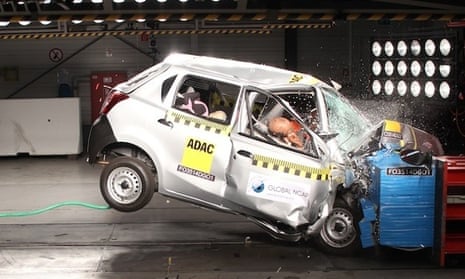The global organisation for car safety has won a David and Goliath style battle with car giant Nissan to improve the safety of a brand new model that it argued should never have been allowed to go on sale.
The Japanese car company has agreed to strengthen the body shell and fit airbags of its Datsun Go model, which has been on sale in India and South Africa since last year.
Nissan had initially defended the integrity of the vehicle after the Global NCAP publicly called on Nissan last year to withdraw it from the Indian market. A crash test showed the Go had so little structural integrity that passengers were unlikely to survive a head-on collision.
David Ward, chief executive of Global NCAP, said the episode was a wake-up call to all car manufacturers that it is unacceptable to sell potentially dangerous cars in emerging markets and use the excuse that they comply with local legislation.
The victory over Nissan comes after Global NCAP published a major report calling for urgent action on vehicle safety, warning that millions of new cars being sold in middle- and low-income countries fail to meet UN basic safety standards for front and side impacts.
The report outlines a 10-point plan, including urging governments and the insurance industry to provide fiscal incentives and discounts to car buyers who opt for safer models and calling on automobile manufacturers to improve their sustainability reporting to include data on the applied safety standards of its global vehicle production.
Global NCAP chairman Max Mosley said: “Safety improvements stimulated by legislation and consumer awareness campaigns in high-income economies that have saved hundreds of thousands of lives are not yet systematically available for drivers and their families in rapidly growing lower-income markets.
“Crash-test standards introduced 20 years ago for cars sold in Europe are yet to be met by many new cars being sold today in leading middle-income countries in Africa, Asia and Latin America. This is entirely unacceptable. Manufacturers cannot continue to treat millions of their customers as second-class citizens when it comes to life-saving standards of occupant protection.”
Ward said Nissan had complained that it was unfair to pick on the Datsun Go because “there were other cars on the market that were as bad, but we pointed out they were designed quite a few years ago. It was very significant that a brand new car was being introduced well into the UN Decade of Action for Road Safety should perform so badly.
“Ten companies produce 80% of all cars and they all know how to pass the safety tests. An obvious lesson is that they should all voluntarily agree minimum safety standards and then they can compete over and above that. If they do that, then the smaller manufacturers will have little option but to follow suit.”
Ward said the car industry tends to exaggerate the cost of safety improvements and estimated the cost of fitting two airbags and strengthening the body shell of the Datsun Go would cost only around $200. He said even customers on a tight budget would be prepared to pay the extra cost to avoid the risk of death or serious injury.
“These decisions are entirely driven by budget,” he said. “There is a disconnect between the engineers who are trying to do their best and the financial people who try to save money by cutting back on safety features. This is what happens without a proper regulatory framework.”
Ward says he met the head of the Datsun brand, Vincent Cobee, in February and will be meeting Nissan executives in May in Japan to press them to test the newly strengthened model before it goes on sale. Until then, Global NCAP is maintaing its position that the company should immediately stop selling the current model.
A spur for action by Nissan, according to Ward, was that publicity over the crash test affected sales of the Datsun Go. He said this was a powerful example of the ability of consumers to drive change once they have the right information.
This is not the first time that Global NCAP has clashed with Nissan. Mosley has in the past written two private letters to the company’s CEO outlining problems with cars it is selling in Latin America, but never received a response.
His complaint came after NCAP crash-tested the Nissan Tsuru in 2013. The car came close to total collapse and is fitted only with two-point seatbelts instead of the conventional three-point seatbelts in the rear, making it impossible to fit a child seat properly.

Despite the dismal performance of the Tsuru, Nissan responded at the time to the Guardian by saying “the Tsuru meets safety regulations in the markets where it is sold. It is one of the best-selling sub-compact vehicles in our market due to its proven affordability, durability and reliability”.
A spokesperson for Nissan now said: “As a company, we invest in continuous product and model line-up enhancement taking into account market trends and customers’ requirements. As part of ongoing product development we will offer driver’s airbag as an option for Datsun GO+ and Datsun GO in India. Some technical evolution of the base car will also be implemented across the line-up to ensure efficient airbag performance.”
While the Datsun Go was the worst model to be tested in India, six other popular cars sold there also scored a zero rating. The others were the Maruti Suzuki Swift, Maruti Suzuki Alto 800, the Hyundai i10, the Ford Figo, the Volkswagen Polo, and the Tata Nano. The results are significant because India is the fifth-largest producer in the world of passenger cars and latest figures show that around 140,000 are killed in road accidents every year.
After the results were published, Volkswagen decided to withdraw the models that did not have two airbags as standard and Toyota made a commitment to fit airbags in all cars sold in India.
The social impact hub is funded by Anglo American. All content is editorially independent except for pieces labelled “brought to you by”. Find out more here.
Join the community of sustainability professionals and experts. Become a GSB member to get more stories like this direct to your inbox

Comments (…)
Sign in or create your Guardian account to join the discussion